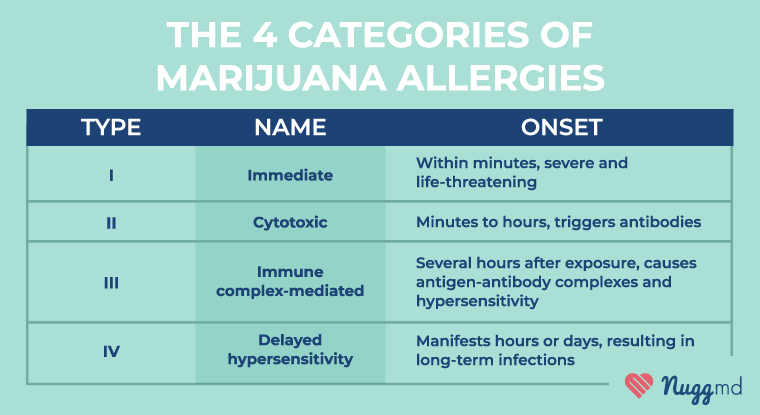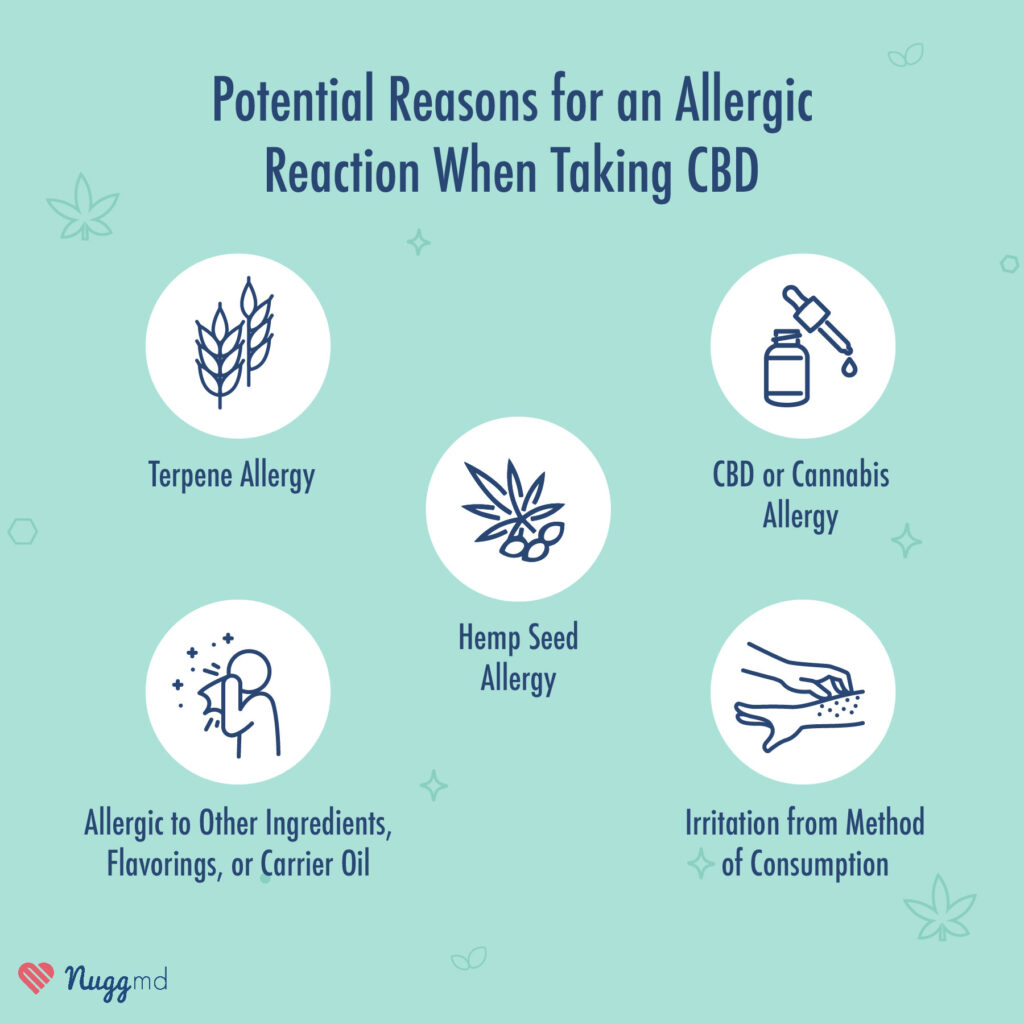In This Article
- Can You Be Allergic to Marijuana?
- Can You Be Allergic to CBD?
- Symptoms of a Cannabis Allergy
- How is a Weed Allergy Diagnosed?
- Testing for a Cannabis Allergy
- What Causes an Allergic Reaction to Weed?
- How is a Cannabis Allergy Treated?
- Does Consumption Method Matter for a Cannabis Allergy?
- Ingredients and Other Factors
- Terpene Allergies
- References
Key Takeaways
- Cannabis allergies are extremely rare but do happen and can range from mild to severe.
- Terpenes and other plant compounds are the most likely culprits in cannabis allergies.
- There is no evidence allergies to THC or CBD themselves are possible.
According to the Centers for Disease Control, about 50 million people in the U.S. are allergic to something. You can be allergic to almost anything: food, airborne substances, latex, medications, stinging insects, or household pets.
Allergies occur when the body’s immune system responds to a foreign substance entering the body or skin. The body’s natural defense system typically surrounds and disposes of the irritant. In an allergic reaction, antibodies attack and form histamine, which causes allergy symptoms.
Plants can trigger allergic reactions, and cannabis is no exception. How common is it to be allergic to weed? How can you tell if you have a cannabis allergy, and more importantly, can an allergic reaction to weed be dangerous?
Can You Be Allergic to Marijuana?

Allergies are a complex immune response triggered by typically harmless substances. Some people explore cannabis for relief from common allergy symptoms, citing its anti-inflammatory and bronchodilatory (airway opening) effects.
Can you be allergic to cannabis? Cannabis allergies are rare, but it may trigger an allergic reaction as it’s smoked, eaten, or touched. Fortunately, cannabis allergies are usually mild, but that isn’t always the case.
So far, there have been limited studies exploring cannabis allergies. Looking at 544 patients visiting allergy clinics for respiratory or skin symptoms, only 0.3% (or less than two people) were sensitive to cannabis.
These patients showed positive test results from a skin prick test using crude cannabis extract and did show allergic reactions upon exposure to cannabis.
While most reported cases of a weed allergy are among recreational users, there’s growing evidence suggesting that occupational exposure to cannabis can also lead to significant allergic reactions. Sensitivity is particularly relevant for individuals working in environments with frequent cannabis contact, such as laboratories, police departments, and facilities processing cannabis. These work-related exposures link to a range of Type I hypersensitivity reactions, varying from minor localized symptoms to severe, potentially life-threatening anaphylactic responses.
Interestingly, there seems to be a correlation between cannabis allergies and allergies to other plant-based foods. Nearly half of the patients with cannabis allergies studied (45%) reported generalized or severe plant food allergies. This number jumped to 71% in patients who experienced anaphylaxis or a severe life-threatening reaction to cannabis exposure.1
Can You Be Allergic to CBD?

There are various reasons a person could experience an allergic reaction to CBD products. Like with THC, the most probable is that they’re not allergic to the CBD itself, but rather, another ingredient, such as flavorings and carrier oils commonly found in CBD products, which trigger an allergy flare-up in many people.
If you find yourself experiencing adverse reactions to CBD, it's much more likely that these other ingredients are to blame rather than the CBD. For example, many people are allergic to coconut oil, a standard carrier oil used in CBD products. So, if you're experiencing any reactions, don't jump to conclusions; you may not be allergic to CBD. Of course, if you have a cannabis allergy, CBD will fall under that same umbrella.
Symptoms of a Cannabis Allergy

Allergic reactions to weed resemble similar symptoms of other allergies. However, after using or exposure to cannabis, sudden new symptoms may arise. Most reactions to cannabis are classified as Type I hypersensitivities, meaning symptoms appear within minutes of exposure.
Following exposure to irritants or allergens, the body releases histamines, which cause various symptoms. The most common allergic reactions to weed affect the upper airway system, including the nose, throat, and eyes.
The nose and pharynx, or the back of the throat, may itch, causing a scratchy and uncomfortable sensation. Nasal passages become inflamed, resulting in a stuffy nose, runny nose, or sneezing. Eyes water excessively in response to irritation of the eyes and nose.
Lower respiratory irritation causes coughing, mild to severe difficulty breathing, wheezing, and chest tightness.
Some patients report skin-related symptoms, like local or generalized itching, hives or welts, and eczema flare-ups. Allergic reactions to cannabis don’t usually cause stomach or heart-related symptoms.
Doctors note that these symptoms may be a reaction to the irritation caused by cannabis smoke and not allergies. Cannabis, whether smoked or ingested, often causes red eyes, but this is a biochemical reaction and not an allergic reaction.
All of these symptoms occur shortly after cannabis use, usually within 30 minutes. Whether you smoke, vape, drink, eat, or use cannabis topically doesn’t change the allergic response for most people.2
Cannabis allergy is not the same as cannabinoid hyperemesis syndrome. Cannabinoid hyperemesis syndrome (CHS) has a different mechanism of action than a cannabis allergy. CHS develops from overstimulated cannabinoid receptors in the stomach. The gut becomes inflamed and causes nausea and vomiting. CHS develops over time, and ongoing use of cannabis increases the frequency of cyclical vomiting. CHS resolves upon total discontinuation of cannabis use.3
How is a Weed Allergy Diagnosed?
If you suspect you are allergic to weed, what is the next step? Simply discontinue cannabis use and contact your healthcare professional for diagnosis.
Diagnosing a cannabis allergy involves the evaluation of one’s medical history, testing for allergen reactions, and ruling out other possible causes for symptoms.
Common adverse effects of cannabis can mimic some allergy symptoms, such as red eyes, nasal congestion, and cough. Conditions like asthma also share some similarities with an allergic reaction. A thorough description of symptoms following cannabis use will help the doctor determine whether to test for allergies.
A consumer’s medical history, including other known allergies or immune disorders, will provide the healthcare professional with the needed background. Next, the physician will test physical sensitivity to cannabis.
Testing for a Cannabis Allergy
The first line of diagnostic testing for allergies is a skin scratch test. The allergist introduces small sample extracts of buds, leaves, and other raw parts of the plant to the skin. It is possible to react allergically to one type of cultivar over another. Sensitivity to the allergens appears on the skin within minutes.
However, contaminants such as mold in the extracts may affect skin tests. Contaminants have the potential to cause symptoms that are difficult to distinguish from a genuine cannabis allergy.
Alternate testing options may provide a more definitive diagnosis. The body’s immune system forms antibodies or immunoglobin (IgE) to combat allergens. From a blood sample, in vitro tests check for hemp-specific antibodies, showing an immune response. High levels indicate a potential allergy.
Cell activation tests expose immune cells to a specific allergen, in this case, cannabis, and measure the response. A basophil activation test (BAT) exposes these specialized basophil blood cells to whole raw cannabis extract (as opposed to isolated compounds). If they are activated, the allergy is confirmed.
Passive Mast Cell Activation Test (pMAT) isolates the mast cell, a type of immune cell, and exposes it to antibody blood serum from the patient. The activation response indicates an allergy to cannabis extract.
Negative results on these allergy tests effectively eliminate a cannabis allergy diagnosis.2
What Causes an Allergic Reaction to Weed?

Over the past few decades, scientists have identified and studied numerous cannabis allergens. The World Health Organization and International Union of Immunological Societies Allergen Nomenclature Sub-Committee recognizes four allergens.
One of the most extensively studied allergens of cannabis is Can s 3. Scientists produce recombined versions of other proteins to help evaluate allergies, also including Can s 2 (cannabis profilin), Can s 4 (cannabis oxygen-evolving enhancer protein 2), and Can s 5 (cannabis pathogenesis-related protein 10).2
By studying allergens such as Can s 3, scientists can identify specific proteins in cannabis that trigger allergic reactions in sensitized individuals. This knowledge is needed to understand the mechanisms underlying cannabis allergies and helps scientists develop diagnostic tests and pinpoint treatment strategies.
The classification of an allergic or hypersensitivity reaction helps understand the type of immune response it triggers. A Type I hypersensitivity or immediate reaction occurs when the allergen triggers the release of IgE antibodies. This release is the mechanism that causes an allergy to cannabis.
These antibodies bind to mast cells, a type of immune cell. The binding causes mast cells to release histamine and other inflammatory mediators, leading to the symptoms of an allergic reaction.4
Each of these tests provides researchers with more insights into the relevance of cannabis allergens and moves treatments forward.
Could this be a THC allergy? Interestingly, cannabis allergy isn’t tied to cannabinoids like THC or CBD. Instead, the Can s 3 allergen causes sensitization and allergic response.
How is a Cannabis Allergy Treated?
Some cannabis users with mild symptoms reach for an over-the-counter medication like Benadryl to treat mild symptoms of allergies, cannabis or otherwise.
The only guaranteed therapy for cannabis allergy is complete avoidance of cannabis products.
Researchers are not sure why, but many foods cross-react with cannabis allergies. Known allergies to common foods like tomatoes, peaches, and hazelnuts can cause an allergic reaction in people with a cannabis allergy.2 Your healthcare professional will be able to advise potential sensitivities.
If exposure to cannabis is unavoidable, there are options to manage allergy symptoms, such as active therapies like medication and immunotherapy. If the allergy causes severe reactions, such as anaphylaxis, doctors prescribe epinephrine autoinjectors or EpiPen. The patient self-administers an injection immediately at the onset of severe symptoms and can avoid a more serious or fatal reaction.
In some fields, like law enforcement or cannabis processing, wearing personal protective equipment like gloves and air filtering masks can reduce the risk.
There is hope for some desensitization therapies for those who cannot avoid the risk of exposure to cannabis materials.
One research study noted that a policewoman experienced several episodes of anaphylaxis after exposure to cannabis. Given her line of work, contact with cannabis could not be either predicted or avoided in the future.
The study stated she was prescribed omalizumab, an injectable asthma medication. After four months of treatment with a 300mg injection every four weeks, even exposure to large amounts of cannabis did not cause anaphylaxis.2
Immunotherapy treatments boost the body’s immune system to strengthen the attack on allergens. Crude cannabis protein immunotherapy is a novel approach to cannabis pollen-related rhinitis and asthma.
The primary treatment for cannabis allergy is complete avoidance of cannabis products. However, there are efforts to explore active therapeutic approaches, such as omalizumab and immunotherapy, when avoidance is impossible. Researchers hope to find future desensitization protocols to help patients with cannabis allergies.
Does Consumption Method Matter for a Cannabis Allergy?

Some cannabis users who suspect they may have a weed allergy will try a workaround, switching from flower to vape or edibles, for example. Although the hope is that symptoms will ease with a different form of consumption, it isn’t likely.
An allergic reaction to weed depends on individual immunology. Remember, it isn’t the cannabis itself that produces the symptoms, but the cannabis allergens, like Can s 3. One method of consuming cannabis won’t make a difference over another.
However, smoking cannabis can be the most irritating to your upper and lower respiratory system. Whether you have an allergy to cannabis or not, introducing smoke of any kind can trigger side effects that mimic allergies. If smoke is the irritant, symptoms may be relieved if you switch to edibles.
If you suspect a cannabis allergy, the best approach is to contact your healthcare professional for the next steps.
Ingredients and Other Factors

Diagnosing an allergy includes identifying and eliminating potential causes of symptoms.
For example, if experiencing a stuffy nose after using cannabis, is this a weed allergy? Not necessarily.
Cannabis does cause some adverse reactions, and several are similar to allergy symptoms. Red eyes and a stuffy nose are both side effects of cannabis and allergy symptoms. If one’s eyes and nose are also runny and itchy, it could be a cannabis allergy, a reaction to cannabis contaminants, or an unrelated allergen.
Distinguishing between a true cannabis allergy and reactions to other ingredients like terpenes can be challenging. Since symptoms may overlap with common adverse effects of cannabis use, clinical evaluation, and allergy testing can help differentiate them.
In some cases, other allergens can masquerade as a THC allergy since the symptoms are similar. Common alternative causes include substances we encounter daily.
Mold is everywhere around us and is a common allergen. Contaminants in cannabis, like mold, can cause symptoms that are difficult to distinguish from a cannabis allergy.2
Proteins in certain foods can also set off allergic reactions. Cannabis shares protein structures with many foods. Food allergies mediated by IgE can cause Type I immediate reaction hypersensitivities. Cannabis sensitivities are also IgE mediated and, like food allergies, can range from mild to anaphylactic.
Terpene Allergies
Terpenes in cannabis enhance many of the beneficial effects of using cannabis but are also associated with allergic reactions. Terpenes are organic compounds that often have intense aromas and are common in many plants. Some terpenes, like limonene, caryophyllene, and myrcene, appear in many scented products. Turpentine oil extracts these fragrance terpenes for various industries and can be a source of related allergies. Artists and painters working with oil paints commonly experience allergic contact dermatitis from oxidized terpenes like limonene and linalool are known to cause allergic contact dermatitis (ACD).5
Research indicates that a cannabis allergy is much less common than other allergens like food and is difficult to diagnose without testing. A comprehensive allergy screening panel is the most reliable way to pinpoint the cause of any allergic reaction.
References
- Decuyper II, Hans-Peter Rihs, Gasse V, et al. Cannabis allergy: what the clinician needs to know in 2019. Expert Review of Clinical Immunology. 2019;15(6):599-606. doi:https://doi.org/10.1080/1744666x.2019.1600403 ↩︎
- Toscano A, Ebo DG, Abbas K, et al. A review of cannabis allergy in the early days of legalization. Annals of allergy, asthma, & immunology. 2023;130(3):288-295. doi:https://doi.org/10.1016/j.anai.2022.10.016 ↩︎
- Chu F, Cascella M. Cannabinoid Hyperemesis Syndrome. In: StatPearls [Internet]. StatPearls Publishing; 2023. https://www.ncbi.nlm.nih.gov/books/NBK549915/ ↩︎
- Abbas M, Moussa M, Akel H. Type I Hypersensitivity Reaction. In: StatPearls [Internet]. StatPearls Publishing; 2023. https://www.ncbi.nlm.nih.gov/books/NBK560561/ ↩︎
- Karlberg A, Lepoittevin J. One hundred years of allergic contact dermatitis due to oxidized terpenes: What we can learn from old research on turpentine allergy. Contact Dermatitis. 2021;85(6):627-636. doi:https://doi.org/10.1111/cod.13962 ↩︎
The information in this article and any included images or charts are for educational purposes only. This information is neither a substitute for, nor does it replace, professional legal advice or medical advice, diagnosis, or treatment. If you have any concerns or questions about laws, regulations, or your health, you should always consult with an attorney, physician or other licensed professional.




